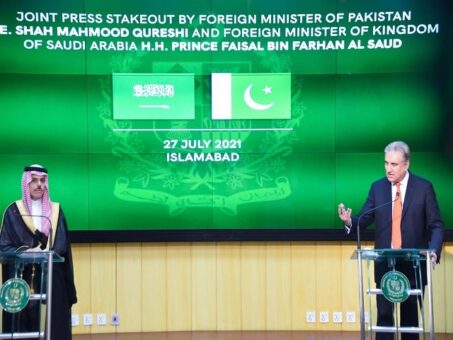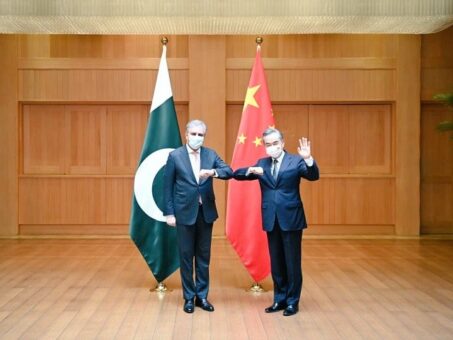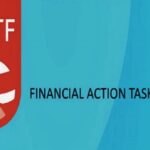ISLAMABAD: Pakistan and China on Saturday underscored China-Pakistan Economic Corridor (CPEC) has entered the new phase of high-quality development, greatly contributing to the socio-economic development in Pakistan.
“The two sides will continue to firmly advance the construction of CPEC, ensure timely completion of under-construction projects, focus on economic and social development, job creation and improvement of people’s livelihood, and further strengthen cooperation in Industrial Park, infrastructure development, science and technology, medical and health, agriculture, human resources training, with the aim to continuously unleash the great potential of CPEC to make it a hub of regional connectivity,” a joint press release said.
Both sides agreed on the need to build health, industry, trade, digital and green corridors.
Both sides reviewed with satisfaction the remarkable achievements of CPEC.
The two sides look forward to convening the 10th JCC meeting to jointly promote the high-quality development of the CPEC and move forward the high-quality construction of BRI.
Both reached a consensus to collectively take measures to safeguard their common interests and promote peace, prosperity and development in the region.
The reiteration was made during a third session of the foreign ministers’ strategic dialogue in Chengdu, capital city of Sichuan province, China.
During their talks, Foreign Minister Makhdoom Shah Mahmood Qureshi and State Councilor, Foreign Minister of China Wang Yi exchanged views on bilateral strategic, economic and security cooperation, besides other global and regional issues.
Both the sides also discussed COVID-19 pandemic, peace and reconciliation in Afghanistan and international and regional issues of mutual interest.
On the invitation of the State Councilor and Foreign Minister Wang Yi, Foreign Minister Shah Mahmood Qureshi paid a two-day visit to China. The foreign minister was accompanied by senior officials. The visit was part of the high-level exchanges between Pakistan and China.
Both sides reviewed their cooperation on regional and international issues at multilateral forums such as the United Nations, Shanghai Cooperation Organization and ASEAN Regional Forum, and agreed to deepen coordination and cooperation to safeguard mutual interests and uphold principles of fairness and justice.
“Both sides reaffirmed their commitment to the purposes and principles of the UN Charter, and support for multilateralism, free trade and win-win cooperation,” it was added.
Both sides underscored that a peaceful, stable, cooperative and prosperous South Asia was in the common interest of all countries. Both sides agreed on the need to settle disputes and issues in the region through dialogue on the basis of equality and mutual respect. The Pakistan side briefed the Chinese side on the deteriorating situation in Jammu & Kashmir, including its concerns, position and current urgent issues.
“The Chinese side reiterated that the Kashmir issue is a dispute left over from history between India and Pakistan, which is an objective fact, and that the dispute should be resolved peacefully and properly through the UN Charter, relevant Security Council resolutions and bilateral agreements. China opposes any unilateral actions that complicate the situation,” the joint press release said.
Both sides recalled that the enduring Pakistan-China friendship has reached the momentous milestone of the 70th anniversary of establishment of diplomatic relations, being enthusiastically marked in the two countries with holding of more than hundred celebratory events throughout this year, demonstrating warmth and deep sentiments of their unshakable fraternal bonds.
In further strengthening their all-weather strategic cooperative partnership and together charting course for the Pakistan-China community of shared future in the new era, both sides were committed to firmly implementing the consensus reached between their leaders, enhance mutual strategic trust, strengthen all-round cooperation, maintain momentum of high-level exchanges, further advance Belt and Road partnership, promote bilateral relationship to a higher level, and delivering greater benefits to both countries and the two peoples.
Extending felicitations to the Chinese side on the 100th anniversary of the founding of the Communist party of China, the Pakistani side recognized CPC’s immense contributions for the Chinese people, for China’s stellar rise at the world stage, and its unrivalled achievement of lifting 800 million people out of poverty.
The Pakistan side wished the Chinese government and people greater success in achieving the goal of socialist modernization in 2035 and building a modern, prosperous, beautiful, democratic, culturally advanced and harmonious socialist country in 2049, under the inspiring and visionary leadership of the CPC, with Comrade Xi Jinping at its core.
Stressing that peace and stability in Afghanistan was vital for socio-economic development, connectivity and prosperity in the region, both sides called on all Afghan stakeholders for comprehensive ceasefire, and work together in earnest to achieve broad-based and comprehensive, inclusive, negotiated political settlement.
Both sides reaffirmed their commitment to facilitate and support “Afghan-led and Afghan-owned” peace and reconciliation process for the early realization of a peaceful, stable, united and prosperous Afghanistan, which would firmly combat terrorism and live in harmony with its neighbours.
Both sides reaffirmed their support for the peaceful reconstruction of Afghanistan, their readiness to expand economic and trade ties, and support Afghanistan in enhancing its capacity for independent development.
Both sides reviewed with satisfaction their close cooperation in successfully controlling the spread of COVID-19, cooperation in protective and medical equipment, vaccine development and ensuring early post-pandemic economic recovery.
The Pakistan side thanked China for its steadfast support to the vaccination drive in the country, and setting up of vaccine finish facility at the National Institute of Health in Islamabad.
“Chinese side expressed its resolve to continue assisting Pakistan in strengthening its national health systems and dealing with adverse socio-economic impacts of the pandemic,” press release said.
Both sides believe that the study of origins of the SARS-CoV-2 was a matter of science, and should not be politicized. The joint report of the WHO-convened global study of origins of the SARS-CoV-2, published this March, has drawn an authoritative and scientific conclusion of related issues.
This joint report should be recognized, respected and preserved, and should be treated as the basis of the WHO next stage of the origin tracing study as well.
“We hope that the WHO can, together with international community, defend the scientific and serious study of origins of the SARS-CoV-2 and oppose the actions to politicize the issue, and safeguard the favorable atmosphere for global cooperation against the Covid-19 pandemic,” the press release quoted the sides.
Offering condolences on the loss of precious lives caused by torrential rains and flooding in Henan province, the Pakistan side expressed hope that with strenuous efforts of the Chinese government, normalcy would be restored soon and affected people would return to their homes.
Both sides vehemently condemned the terrorist attack in Dasu which caused loss of precious lives and injuries to the Pakistani and Chinese workers.
The Pakistan side conveyed its profound condolences and sympathies to the bereaved families, emphasized that the sacrifices of Chinese nationals would not be in vain, and that China-Pakistan partnership would emerge stronger through this test.
The Pakistan side promised to ensure medical treatment, care and comfort of the injured.
“Both sides expressed their firm resolve to expose the culprits and their reprehensible designs through the ongoing joint investigation, give exemplary punishment to the perpetrators, ensure comprehensive safety and security of the Chinese projects, nationals and institutions, and prevent recurrence of such incidents,” it was added.
Both sides agreed on continuing their unyielding support on issues concerning each other’s core national interests.
The Chinese side reiterated its firm support to Pakistan in safeguarding its territorial integrity, sovereignty and independence, independently choosing a development path based on its national conditions, striving for a better external security environment and playing a more constructive role on international and regional affairs.
The Pakistan side reiterated its commitment to the “One China Policy” and firm support to China on core issues of its national interest, such as Taiwan, Xinjiang, Tibet, Hong Kong and South China Sea.
Later, addressing a joint presser along with his Chinese counterpart, the foreign minister expressed satisfaction over the bilateral ties between the two countries.
He said on the issue of bilateral ties, they were satisfied that these were moving in the right direction.
All the strategic, economic and security cooperation between the two counties was moving ahead with determination, he said, adding that both sides in their bilateral meeting held today, co-shared their point of views on further strengthening of this cooperation.
He said their delegation level talks were held in a very friendly and cordial atmosphere in which both sides reiterated support to each other.
Qureshi assured the leadership of China that Pakistan and China ‘are friends and will remain as friends….let the world should know that we are trusted friends’. ‘Pakistan and China are on the same page’, he further added.
The foreign minister also thanked the Chinese leadership for their reiterated commitment to the issue of Jammu and Kashmir.
Qureshi demanded that India should revoke its unilateral and illegal actions of August 5 on Indian Illegally Occupied Jammu and Kashmir and restore its status.
He also expressed his gratitude to China for its firm support to Pakistan in dealing with Covid 19 and by supplying doses of coronavirus vaccines.








